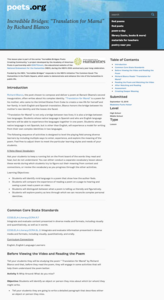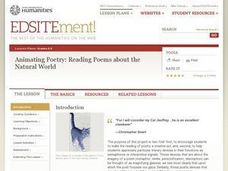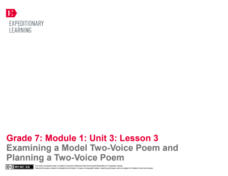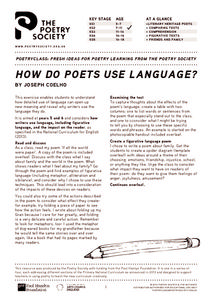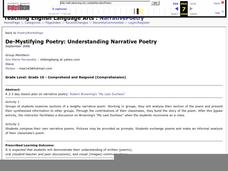Academy of American Poets
On "El Florida Room" by Richard Blanco
Scholars of all ages examine Richard Blanco's poem, "El Florida Room." Looking closely at pictures, pupils look for details that stand out to them, then read the poem. A whole-class discussion allows learners to reflect on what they...
Academy of American Poets
Incredible Bridges: “Cotton Candy” by Edward Hirsch
Read it, hear it, see it, do it! Young poets experience Edward Hirsch's memory poem, "Cotton Candy," by first closely reading the poem silently, then aloud, watching a video of the poet reading it, and crafting their memory poem of an...
EngageNY
Notices, Wonders, and Vocabulary of the Third Stanza of “If”
How does one's experience reading a poem's text differ from listening to its audio version? Delve into the insightful question with the poem, If by Rudyard Kipling, as pupils compare and contrast their experience using a note-taking...
Academy of American Poets
Incredible Bridges: “Translation for Mamá” by Richard Blanco
Who or what do you miss? That's the question that launches an activity that asks writers to craft a paragraph filled with sensory details that shows how they feel. Next, they listen to Richard Blanco reading his poem, "Translation for...
National Endowment for the Humanities
Animating Poetry: Reading Poems about the Natural World
Students complete poetry analysis activities. In this poetry analysis instructional activity, students consider the use of imagery and sound devices in poetry. Students translate poetry into another art, read a diverse selection of...
Curated OER
Henry Wadsworth Longfellow's Christmas Bells
Students read and analyze the anti-slavery poem, "Christmas Bells" by Henry Wadsworth Longfellow. They discuss the content and form of the poem, write an essay, write an original poem, examine how this anti-slavery poem was converted...
Prestwick House
Teaching Shakespeare: Sonnet 73
It's that time of year to consider how Shakespeare selects his images and structures his Sonnet 73 to develop the meaning of the poem. Class members examine the rhyme scheme, the indented lines, the conceit, and the images used in each...
Curated OER
Lesson: Paul Chan: Tree of Life
Paul Chan's work has been known to show the cycle of change. Learners explore the concept of change by analyzing his work and reading the poem "For Which it Stands." They consider symbolism, communication, art, and society as they use...
Angel Island Immigration Station Foundation
Moving to the Poems of Angel Island
A poem carved on Angel Island's walls is the guiding text of a instructional activity that challenges scholars to put movement into a written piece of art. After warm up-activities, learners play a game of "Pass the Clap" and "Pass the...
Poetry4kids
Alliteration and Assonance Lesson Plan
Scholars analyze the poem My Puppy Punched Me in the Eye by Ken Nesbitt in order to locate examples of alliteration and assonance. After reading the poem, alliterative words are underlined and assonant words are circled.
EngageNY
Examining a Model Two-Voice Poem and Planning a Two-Voice Poem
Successful poetry writing requires three P's: planning, preparation, and practice. Pupils read a model two-voice poem and discuss how the author uses evidence to develop the theme. With a partner, scholars use a rubric to analyze the...
Utah Education Network (UEN)
7th Grade Poetry: Ode Poem
Walt Whitman's "Captain, My Captain" and Robert Frost's "The Road Not Taken" provide seventh graders with examples of odes. After reading and discussing these and other examples, young poets craft an ode and respond to the ode of a...
Poetry Society
How do Poets Use Language?
Why do writers choose the language they do? Here's a resource that has the poet himself answer that very question. Joseph Coelho explains why he chose the words and images he used in his poem, "If All the World Were Paper."
National Endowment for the Humanities
Thirteen Ways of Reading a Modernist Poem
High schoolers analyze modernist poetry and the role of speaker in example poems. Learners study modernist poems from the Romanticism and Victorian periods as well as Wallace Stevens' "Thirteen Ways of Looking at a Blackbird." Using a...
Core Task Project
Whatif by Shel Silverstein
What a skillful way to incorporate Shel Silverstein, a wonderful author, into the classroom. Composed of three tasks, children are led through a series of text-dependent questions that force them to unveil the meaning of Silverstein's...
National Endowment for the Humanities
Emulating Emily Dickinson: Poetry Writing
High schoolers analyze mood and voice in Emily Dickinson's poem, "There's a Certain Slant of Light." After the analysis, students write a poem of their own emulating the Dickinson poem, and then write a one-page essay describing what...
Curated OER
Edward Lear, Limericks, and Nonsense
Introduce your class to the delights of nonsense poetry and explore literary devices with the writing of Edward Lear. Learners identify rhyme and meter as well as figures of speech, alliteration, and onomatopoeia in "The Owl and the...
National Endowment for the Humanities
In Emily Dickinson's Own Words: Letters and Poems
Analyze the depth and beauty of American Literature by reading Emily Dickinson's letters and poems. The class analyzes Dickinson's poetic style and discusses Thomas Wentworth Higginson's editorial relationship with Dickinson. They pay...
National Endowment for the Humanities
Walt Whitman to Langston Hughes: Poems for a Democracy
Explore the idea of democratic poetry. Upper graders read Walt Whitman, examining daguerreotypes, and compare Whitman to Langston Hughes. They describe aspects of Whitman's I Hear America Singing to Langston Hughes' Let America Be...
Teaching English
In Flanders Fields
War is one of the most profound human experiences in history, and is often best depicted in works of art and literature. Introduce class members to the poetry of World War I with this resource that uses John McCrae's "In Flanders Fields"...
Academy of American Poets
Teach This Poem: "Tuesday 9/11/01" by Lucille Clifton
A photograph and a poem remind young people of the events of November 11, 2001. After examining Andrea Booher's photograph taken on September 13, 2001, and reading Lucille Clifton's poem "Tuesday 9/11/01", scholars compare their...
National Endowment for the Humanities
“Every Day We Get More Illegal” by Juan Felipe Herrera
A study of Jan Felipe Herrera's poem "Every Day We Get More Illegal" opens the door for a discussion on immigration. To begin, class members examine the photograph "Desert Survival," record their observations of the image, and then...
Curated OER
De-Mystifying Poetry: Understanding Narrative Poetry
Tenth graders explore narrative poetry. They analyze sections of a poem and present to groups. They compose their own narrative poems using pictures as prompts. They exchange their poems and analyze their classmate's poem.
Academy of American Poets
Teach This Poem: "Old South Meeting House" by January Gill O'Neil
The vaulted ceiling of the Old South Meeting House has heard many voices. Young scholars read an excerpt about its importance in American history and then do a close reading January Gill O'Neil's poem, "Old South Meeting House." After...





